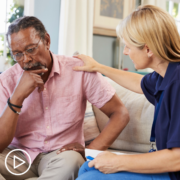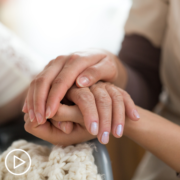Why You Should Speak Up About Your Prostate Cancer Care
Why You Should Speak Up About Your Prostate Cancer Care from Patient Empowerment Network on Vimeo.
What are the benefits of prostate cancer patients speaking up about their care? Linda Mathew discusses the impact of patients taking an active role in their care.
Linda Mathew is a Senior Clinical Social Worker at Memorial Sloan Kettering Cancer Center. Learn more here.
See more from The Pro-Active Prostate Cancer Patient Toolkit
Related Resources

|

|

|
Transcript:
Linda Mathew:
Our medical team is really open about having discussions. So, 1). Our team is not blind to knowing that our patients may want a second opinion just to validate “Hey, is this – do I have all of the information laid out in front of me?”, and we always say it’s like – it’s always good to have that second opinion just to say, “Ah, what’s been told to me is correct, and it goes in line with what I’m reading on the different websites for these places that I’m going to for possible treatment.”
I always tell our patients also that you are your best advocate, so you know what your needs are, and if it means that you need more information before you make a final decision, then do it.
So, if it means talking to other people or going for a second opinion, then go ahead and do that, but I also tell our patients if you’re scared about asking a question, if you’re not – that’s a huge issue. If you’re scared to ask a question to your medical team, that means that, in itself, says, “Hey, is this the right fit?” So, I always encourage our patients, “Our team knows that you want to ask a question. Just go ahead and ask it. You’re not going to embarrass them; you’re not going to embarrass yourself. That’s what your physician and the nurse are there for.”
I think the one thing I would want to stress is that you, the patient, knows themselves. They know what their needs are more so than anybody else, so if that means that you feel like something is missing, then speak up, let us know, and if you don’t feel saying it to the nurse at the moment when you’re in a visit, you can always reach out to the social worker, who can help direct that question back to the team or help you find a way to ask that question either via the portal or an email to the medical team.




